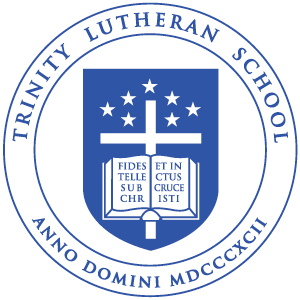Philosophy
Trinity Lutheran School purposefully follows the centuries-old tradition of instructing students in the classical languages, liberal arts, Christian doctrine, and the seven virtues so that they may flourish in faith toward God and love toward their neighbor. We base our philosophy of education upon the following texts:
Proverbs 22:6—Train up a child in the way he should go; even when he is old he will not depart from it.
John 17:17—Sanctify them in the truth; your word is truth.
Ephesians 6:4—Fathers, do not provoke your children to anger, but bring them up in the discipline and instruction of the Lord.
Philippians 4:8-9—Finally, brothers, whatever is true, whatever is honorable, whatever is just, whatever is pure, whatever is lovely, whatever is commendable, if there is any excellence, if there is anything worthy of praise, think about these things. What you have learned and received and heard and seen in me—practice these things, and the God of peace will be with you.
I Peter 3:15—. . .being prepared to make a defense to anyone who asks you for a reason for the hope that is in you; yet do it with gentleness and respect.
Dr. Martin Luther—“Nothing at all will help us but taking the Word of God seriously and preserving it diligently for ourselves and our posterity, especially through the maintenance of good schools and education of youth.”
Liberal Arts
A classical education has historically included the seven liberal arts. These arts are divided into the trivium (“three ways”) and the quadrivium (“four ways”). The arts of the trivium are Grammar, Logic, and Rhetoric (the letter arts). The arts of the quadrivium are Arithmetic, Geometry, Music, and Astronomy (the number arts). While these arts teach certain skills (such as the ability to read or balance a checkbook), their great benefit lies in their general formation of the mind. The liberal arts teach students to think clearly and precisely, to ask right questions, to express their thoughts accurately and persuasively, and to see order in the world around them.
Christian Doctrine
We begin each day with a chapel service, which includes singing hymns, reading God’s Word, listening to a sermon, and praying. Each class also has religion daily, during which students learn the Scriptures, the Lutheran Confessions, and the history and significance of various practices within the Church.
Seven Virtues
Upon this foundation, we strive to teach what is true, good, and beautiful to our students. Furthermore, we receive and share with our students the Theological Virtues from the Scriptures:
Faith: in God as He reveals himself in the Scriptures
Hope: in the promises of Christ, whose strength is made perfect in our weakness
Love: toward all people, as Christ Jesus loves us and gave Himself up for us
As we follow truths that transcend time and space, we also acknowledge the wisdom of the ancients who taught the Cardinal Virtues:
Faith: in God as He reveals himself in the Scriptures
Hope: in the promises of Christ, whose strength is made perfect in our weakness
Love: toward all people, as Christ Jesus loves us and gave Himself up for us
Classical Lutheran Education
We call this approach to education “classical” because it is founded on the rich heritage of Western Civilization. Such an education produced many of the world’s greatest scientists, artists, rulers, theologians, and musicians. It is Lutheran because we depend upon the Scriptures for our understanding of truth and hold to the Lutheran Confessions because they are in accord with the Word of God.
